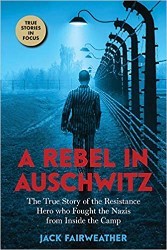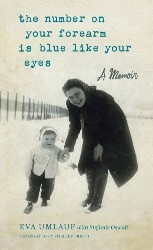After World War II, the remnants of Europe’s Jews were forced to find a place to start a new life in a shattered world. Monica Hesse’s young adult novel, They Went Left, follows the experience of Zofia Lederman, a survivor from Poland who lost almost everyone in the Auschwitz-Birkenau death camp. The book’s title refers to the notorious separation of the camp’s inmates into two groups, those who would be subjected to slave labor, deprivation, and torture, and the others who were immediately murdered. When the novel begins, that process is long over. Zofia has been liberated from the Grosse-Rosen camp by Soviet forces and is setting out on a journey from her native Poland to Germany. Her only goal is to locate her younger brother, Abek, but she is only one among many on a devastated continent hoping that someone from her past is still alive. Hesse has created in Zofia a complex character, determined to return home with Abek and start her life anew, yet tormented by self-doubt.
They Went Left is a work of historical fiction, as well as a mystery and an exploration of the psychological effects of survivors of the Holocaust. Zofia relives her life before the war and the destruction of her family and community, trying to construct a narrative of the past which will enable her to live in the present and future. A skilled seamstress, she sews words into the linings of garments, a metaphor for her ability to preserve her own story and those whom she loves. Arriving at the displaced persons camp of Foehrenwald in Allied-occupied Germany, Zofia meets other young Jews, some planning to settle in Palestine. Although her brief return to Poland had exposed her to continued antisemitism, she cannot commit to an alternative future until she finds Abek.
Zofia becomes romantically involved with Josef, a fellow resident of the camp; their relationship is characterized by ambivalence and grief. Neither one trusts the other, while Zofia’s friend, Breine, who has lost her first fiancé, is preparing to marry a man she has known for only five weeks “because he’s here, I’m here, and we’re ready to not be lonely together.” Zofia is unable to adjust her expectations and to compromise, making it difficult for her to accept that the post-war life of survivors is defined by crushed expectations and the inevitability of loss. The descriptions of Zofia’s strong sexual attraction to Josef are tinged by the violence of their past. In one troubling scene, as part of their intimacy they exchange evidence of the physical abuse they’ve both endured.
The dramatic tension of the novel encompasses Zofia’s search for Abek as well as the fate of others with whom she interacts in a completely altered world. The book’s central mystery is the question of how and when Zofia will assemble the fragments of her past and create a vision for her future.
This highly recommended novel includes “A Note on History and Research,” with useful information and context.
Emily Schneider writes about literature, feminism, and culture for Tablet, The Forward, The Horn Book, and other publications, and writes about children’s books on her blog. She has a Ph.D. in Romance Languages and Literatures.



